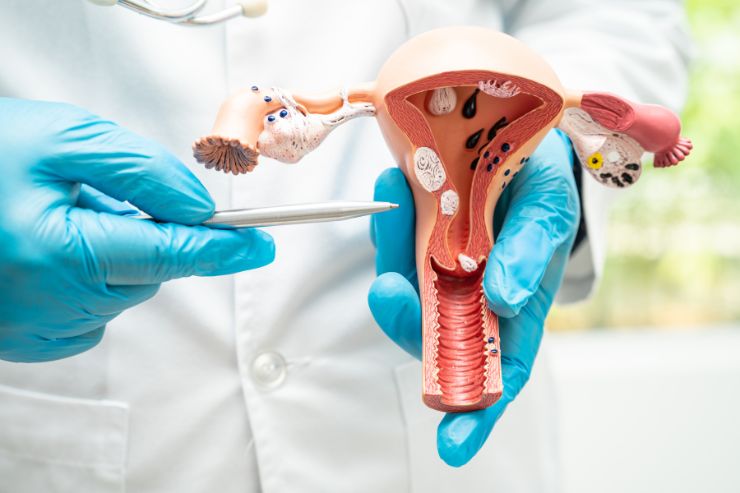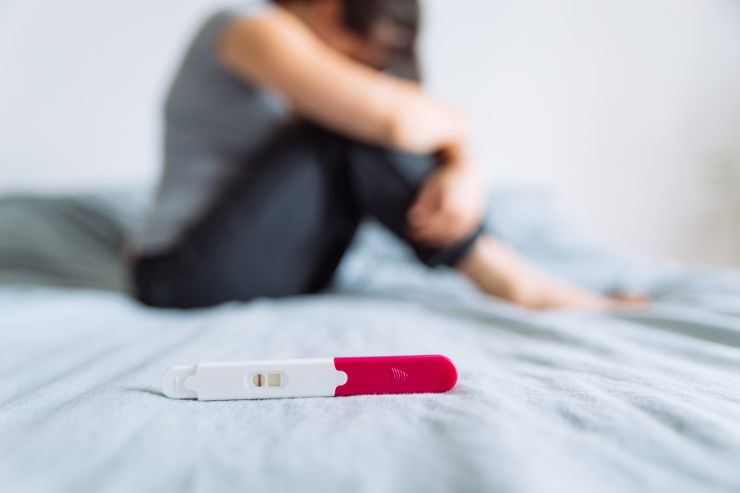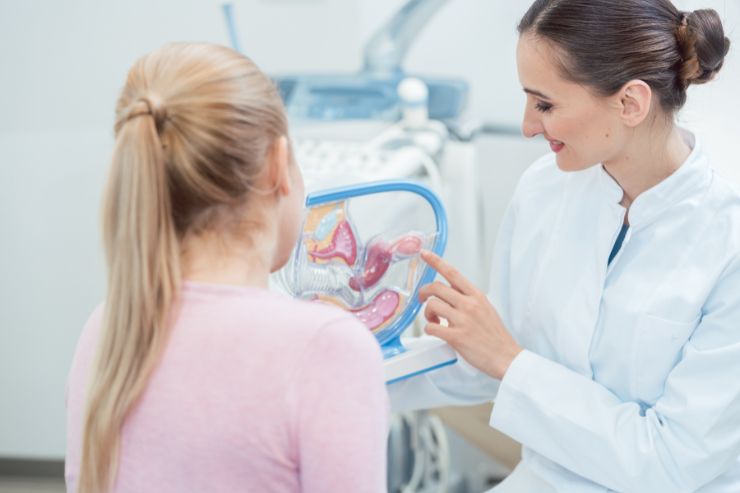A bulky uterus can be concerning, especially when it shows up unexpectedly during a routine checkup or imaging test. But what does it mean? And more importantly, should you be worried?
Let’s uncover the main causes of a bulky uterus, how it affects your health, and what steps you can take to manage it. This guide uses medically reviewed insights to help you understand the signs, symptoms, gynecologic conditions, and treatment options linked to an enlarged uterus.
What is a Bulky Uterus?
Understanding Uterine Enlargement
A bulky uterus refers to an enlarged uterus—a condition where the uterus becomes larger than its normal size. While this might sound alarming, it’s often caused by benign (non-cancerous) conditions.
On average, a healthy uterus is about the size of a small pear. But certain factors can lead to uterine enlargement, ranging from causes and treatment of uterine fibroids to adenomyosis.
Key Symptoms of a Bulky Uterus
- Abnormal uterine bleeding can be one of the symptoms of an enlarged uterus.
- Pelvic pain is one of the common uterus symptoms associated with adenomyosis. or pressure
- Heavy menstrual periods (menorrhagia)
- Frequent urination can be a symptom of an enlarged uterus.
- Lower back pain
- Bloating or a feeling of fullness
7 Common Causes of a Bulky Uterus
Understanding the causes of a bulky uterus may include hormone imbalances and other factors. It is the first step to managing it. Below are the most common reasons:
1. Uterine Fibroids (Leiomyoma)
Uterine fibroids, also called leiomyomas, are the leading cause of a bulky uterus. These are symptoms that may indicate problems with the endometrium. noncancerous growths That develop in the uterine wall, tissue that normally lines the uterus can become displaced.
Why They Matter
- Can range in size from a seed to a grapefruit
- May distort the shape and size of the uterus, leading to symptoms of an enlarged uterus.
- Common in women aged 30–50
Symptoms
- Menorrhagia (heavy bleeding)
- Pelvic pain
- Frequent urination
- Lower back pain
2. Adenomyosis
Adenomyosis occurs when the endometrial tissue (inner lining of the uterus) grows into the uterine muscle wall. This condition leads to thickening of the uterus, making it appear bulky and tender.
Key Signs
- Severe menstrual cramps
- Abnormal uterine bleeding
- Painful intercourse may be a symptom that affects women with an enlarged uterus.
- Enlarged, tender uterus
Adenomyosis Is often underdiagnosed but is a significant contributor to chronic pelvic pain and enlarged uterus causes. uterine enlargement.
3. Endometrial Hyperplasia
Endometrial hyperplasia Is a condition where the tissue that normally lines the uterus grows into the uterine wall. endometrial lining becomes abnormally thick, which can affect women experiencing heavy periods. This thickening is usually caused by a hormonal imbalance—often too much estrogen without enough progesterone.
Why It Leads to a Bulky Uterus
- The uterine lining builds up over time
- Increases uterine mass and volume
Symptoms
- Irregular periods
- Spotting between periods
- Abnormal bleeding
If untreated, hyperplasia can increase the risk of conceiving complications. endometrial cancer.
4. Uterine Polyps
These small, soft growths attached to the inner wall of the uterus can sometimes contribute to uterine enlargement, especially when multiple polyps are present, which can cause an enlarged uterus.
Symptoms Include
- Heavy or irregular bleeding
- Bleeding after menopause
- Fertility issues
While smaller polyps often go unnoticed, larger ones may cause noticeable discomfort and require removal.
5. Ovarian Cysts and Masses
Large ovarian cysts can exert pressure on the uterus, pushing it out of shape and mimicking a large uterus on imaging scans.
Common Signs
- Lower abdominal pain
- Pelvic pressure
- Bloating
Though ovarian cysts aren’t part of the uterus, their proximity can still impact reproductive health and overall pelvic anatomy.
6. Pregnancy-Related Changes
Sometimes a uterus remains enlarged Post-pregnancy, women may experience changes in the endometrium, which can lead to symptoms of an enlarged uterus. due to poor involution (shrinking of the uterus back to its normal size). This can create a bulky appearance, even months after childbirth.
When to Watch Out
- If uterus remains large 6+ weeks postpartum
- Associated with abnormal discharge or bleeding
7. Uterine Cancer
Although less common, pressure on the bladder can occur with an enlarged uterus. endometrial or uterine cancer can lead to a bulky uterus. It often presents in postmenopausal women and can be a cause of adenomyosis.
Red Flags
- Vaginal bleeding after menopause
- Pelvic pressure or pain
- Unexplained weight loss
Early diagnosis is crucial for a better prognosis, so don’t ignore unusual symptoms.
Diagnosis and Treatment Options for Bulky Uterus
How is a Bulky Uterus Diagnosed?
Doctors rely on a combination of clinical evaluation and imaging to determine uterine size and structure: symptoms may indicate issues with the endometrium.
- Pelvic exam
- Transvaginal ultrasound
- MRI scans
- Endometrial biopsy is often recommended to rule out causes of an enlarged uterus. (if needed)
Treatment Options Based on Cause
Treatment depends on the underlying gynecologic condition and severity of symptoms:
1. Medication
- Hormonal therapy (e.g., GnRH agonists for fibroids)
- Pain relievers for symptom control
- Oral contraceptives to manage abnormal bleeding
2. Surgical Interventions
- Myomectomy (fibroid removal)
- Hysterectomy (complete uterine removal)
- Endometrial ablation is a treatment option for women with heavy periods. (for hyperplasia)
3. Minimally Invasive Techniques
- Uterine artery embolization (shrinks fibroids)
- Laparoscopic procedures (less invasive options)
FAQs About Causes of a Bulky Uterus
Q1: Can a bulky uterus affect fertility?
Yes. Conditions like uterine fibroids and adenomyosis can interfere with implantation or increase miscarriage risk.
Q2: Is a bulky uterus always a sign of cancer?
No. Most cases are due to benign conditions like leiomyoma or adenomyosis. However, any abnormal bleeding Should be evaluated by a healthcare professional if you experience symptoms of an enlarged uterus.
Q3: What is the best treatment for a bulky uterus?
Treatment depends on the cause. For example:
- Fibroids: Myomectomy or embolization
- Adenomyosis: Hormonal therapy or hysterectomy
- Hyperplasia: Progestin therapy
Q4: Can menopause shrink a bulky uterus?
Sometimes. The drop in estrogen post-menopause can cause fibroids to shrink, potentially reducing uterine size.
Q5: How is adenomyosis different from fibroids?
- Adenomyosis involves endometrial tissue inside the muscle wall.
- Fibroids (leiomyomas) are solid muscle tumors on or in the uterus.
Conclusion: Take Charge of Your Reproductive Health
A bulky uterus may sound intimidating, but it’s often manageable with early diagnosis and the right treatment plan. Whether it’s fibroids, adenomyosis, or endometrial hyperplasia, understanding the root cause can empower you to take the next step in your reproductive health journey.
If you’re experiencing symptoms, consult a gynecologist. Early detection is the best defense for a healthy uterus and overall wellness.









